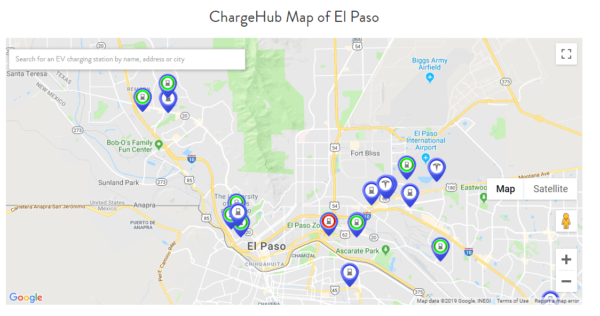EL PASO — Electric vehicle programs are popping up across the U.S. Southwest, but the border region has been slow to embrace the trend with some notable exceptions.
“Electric is coming, don’t kid yourself,” said Royal Jones, owner and CEO of Mesilla Valley Transportation based in Las Cruces.
The company is a six-time recipient of the EPA SmartWay Carrier Excellence Award, which is awarded to businesses for leading their industries in improving freight efficiency and contributing to cleaner air within their supply chains.
“My original reason for being green was because I needed some money.” Jones said about his goal to build up a more efficient fleet. “We like being green, we’re helping keep the air clean.”
Jones’ concern with fleet efficiency began when he first started his company in 1982 and noticed he was losing money because of low fuel mileage in his trucks.
“I started doing the math.” Jones said his trucks were averaging 15,000 miles per month at 4 miles per gallon, but he found that if they averaged just one mile per gallon more, he’d save more than 700 gallons of fuel per month per truck.
“We have always continued to measure all of our performance by the truck, not by the whole,” Jones said.
Jones is not only the CEO of a trucking company committed to reducing emissions , he’s one of a rapidly growing number of electric vehicle owners who want to reduce their personal carbon footprint.
“At first, we really didn’t see very many. We didn’t even have any in stock because nobody came in asking for them,” said Alex Ledesma a technology and product specialist at Rudolph Chevrolet.
“But we’re seeing the demand become higher and higher. People are asking for them. And they want to see them and they want to drive them, so we’re starting to stock them into our inventory,” Ledesma said.
The dealership sells the Chevy Bolt, an electric subcompact hatchback.
Electric vehicles sales in the U. S. increased 130% from 2017 to 2018. In 2017, 104,324 electric vehicles were sold and 240,380 were sold in 2018, according to a report by Clean Technica, an online clean tech website.
Many western states are trying to cater to these new vehicle owners. Arizona, Colorado, Idaho, Montana, New Mexico, Utah, and Wyoming signed a Memorandum of Understanding in October 2017 that established an electric vehicle corridor in the West. The corridor agreement will make it possible to drive seamlessly across the participating states by adding and setting standards for charging stations.
The goal is to eliminate electric car “range anxiety” among consumers. Range anxiety is the fear of not being able to find an electric vehicle charging station when driving long distances.
“The real scary question is, well if I’m not at home, where do I charge?” Ledesma explained. “You find a gas station on every corner, but you don’t find a charging station on every corner.”
Currently, only a handful electric vehicles have a range of more than 300 miles per charge, according to U.S. News and World Report’s 2018 list of top electric cars by range. Tesla’s new Model 3 has a range of only 325 miles, the EPA estimates.
Even in oil-rich Texas, clean city coalitions are established in four large metropolitan areas: the Alamo area around San Antonio; Dallas-Fort Worth; Houston-Galveston, and Central Texas (Austin). The coalitions promote efforts to reduce petroleum use by encouraging the use of alternative fuels and electric vehicles.
El Paso is playing catch up with most other major cities. City Council adopted the “Smart City Initiative” in September 2018 that focuses on smart energy, mobility, and public services. The plan, introduced by El Paso’s Chief Resilience Officer Nicole Ferrini, includes installing electric vehicle charging stations across the city.

ChargeHub.com tracks charging stations by cost and usage.
“We did invest through a grant from the state to deploy broad-based electric vehicle charging infrastructure,” Ferrini said.
There are currently about a dozen electric vehicle charging stations in El Paso.
“We did it at several transfer centers, we did it at the UTEP campus,” Ferrini said. “I believe there’s a few a the Housing Authority campuses. There’s a couple at EPCC, and then we have some at the airport.”
So far, the charging stations aren’t getting a lot of use.
“What we saw was not an incredibly robust usage of it, however we continue to support the effort,” Ferrini said.
One reason El Paso lags behind the rest of the region in adopting electric vehicles may be cost. Jones bought his first Tesla five years ago and said it cost him $100,000.
However, like most new technologies, the price of electric cars is steadily decreasing. The newest Tesla models start at around $49,000.
Less expensive compact electric cars, like the Bolt made by Chevrolet, are still considerably more expensive than their gas-powered counterparts.
Chevrolet sells three compact hatchbacks that are similar in size and passenger capacity. The gas-powered Spark and Sonic, cost $16,095 and $19,295 respectively. The electric Chevrolet Bolt comes in at double the price at $37,495.
Electric vehicle advocates say the technology can pay off in reduced fuel costs and a cleaner environment.The issue is especially significant on the border where air quality along roadways has been linked to a number of health concerns.
Cities like Austin with plentiful charging stations have attracted green transportation companies like Electric Cab North America, which delivers “efficient, zero emission micro transit services to dense urban cores, corporate campuses, and master planned communities,” its website says.
The City of El Paso has hired the company Blink to maintain the charging stations as more are being added.
“I think that we’re really going to follow the market and as more El Pasoans start to utilize that technology, we will definitely be looking at ways to meet that demand,” Ferrini said.

